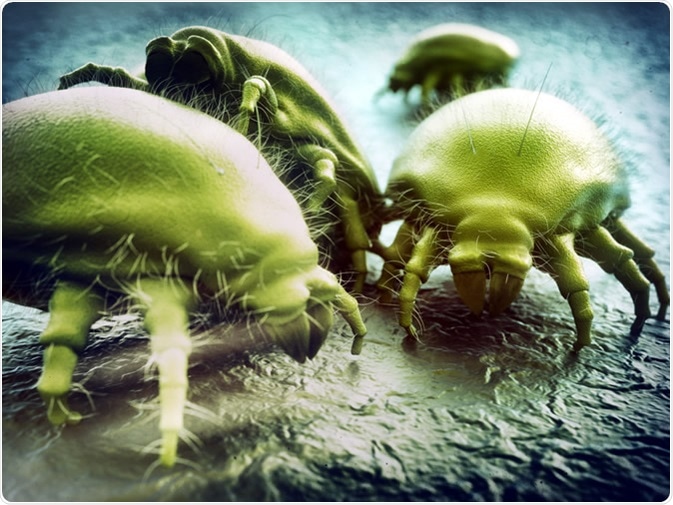Skip to:
Medications and immunotherapy are commonly used to treat allergy. The treatment depends on the allergen involved.

Image Credit: Budimir Jevtic / Shutterstock
Medications
Medications can help relieve allergic symptoms by reducing the body’s immune system reaction. Physician may suggest over-the-counter or prescription medication to treat allergies.
Antihistamines - Antihistamines are the main category of medicines for allergies. They can be used when the symptoms of an allergy develops. They can also be used to prevent allergic reactions.
Decongestants - Decongestants can be used to provide relief from blocked nose caused by an allergic reaction; however, the long-term use of decongestants is associated with deterioration of symptoms and is hence not advisable.
Lotions and creams to treat skin reactions - Certain allergies can lead to skin reaction such as rashes and itchiness. Itchiness caused by an allergic reaction can be treated with creams and lotions. They keep the skin moist and protect it the skin from allergens. Calamine lotion can also be used to reduce itchiness.
Steroids - Medication containing steroids can be used to reduce inflammation caused by an allergic reaction. Steroids are available as creams, tablets, nasal sprays and eye drops.
Immunotherapy
Severe cases of allergies which do not respond to conventional treatment can be treated with allergen immunotherapy. Allergen immunotherapy involves the administration of allergen extracts into the body via injections. They are usually administered over a period of a few years. Immunotherapy may also be administered as drops or sublingual tablets.
Treatment of Anaphylaxis
Anaphylaxis is a life-threatening allergic reaction. Anaphylaxis involves symptoms such as rash, swelling, shortness of breath, vomiting, light-headedness, and low blood pressure. Emergency epinephrine is administered via special injectors in this life-threatening allergic condition.
How can Allergies be Prevented?
Identification and avoidance of the allergy triggers are the most important step in preventing allergic reactions and reducing symptoms.
Preventing Allergy in Children Born to High-risk Families
The following recommendations can help in preventing allergy in children born to high-risk families.
- Exclusive breastfeeding to 4–6 months of age
- Use of hydrolysed milk formulas (for those unable to be breastfed)
- Quitting smoking
House Dust Mites
Dust mites are insects found in household dust. House dust mites are a major trigger for allergy. Dust mites can be controlled by using the following strategies:
- Avoiding the use of carpets and using wood or hard vinyl floorings.
- Regularly washing and vacuuming cushions, soft toys, curtains and sofas.
- Using a HEPA (high efficiency particulate air) filter.
- Regularly wiping surfaces with a damp, clean cloth.

House dust mite. Image Credit: Crevis / Shutterstock
Pets
Pets can also be a major source of allergen. The flakes of their dead skin, saliva and dried urine are major allergens. If the pets cannot be avoided, it is advisable to keep them clean and groomed. Limiting them to a particular area of the house and avoiding their entry in bedrooms may also help.
Mould Spores
Moulds spores can cause allergies in some people. Moulds spores can be avoided by keeping the rooms dry and ventilated.
Food Allergies
Food allergies can be avoided by carefully checking the label for the list of ingredients. Care should be taken when eating food in a restaurant.
Hay Fever
Hay fever or pollen allergies are caused when trees and grasses release pollen into the air. Hay fever is also termed as allergic rhinitis. Hay fever usually develops during the spring and summer. It is advisable to check weather reports for the pollen count and stay indoors when it's high, if possible
Insect Bites and Stings
Insect bites and stings can also cause allergies, hence it is important to take precautions to minimise the exposure. It is recommended to cover exposed skin and wear suitable footwear. Application of insect repellent may also help.
Preventing Severe Allergies (Anaphylaxis)
People at risk of experiencing anaphylaxis, should always carry adrenaline auto-injectors wherever they go. Wearing a MedicAlert or Medi-Tag medallion or bracelet can make others aware of your allergy in an emergency.
Further Reading
Last Updated: Aug 22, 2019